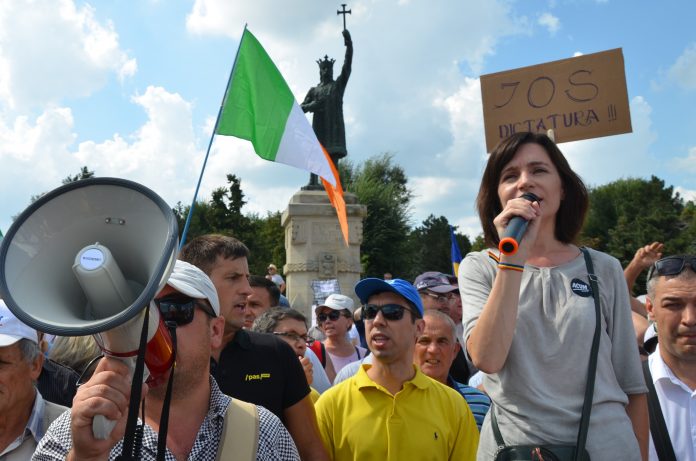The New Year 2019 could mark the start of significant events for Eastern Europe. It will start on January 1 with Romania taking the helm of the rotating presidency of the European Union (and security is at the top of its agenda). Also, in February, Moldova, which neighbours Romania and has particularly close cultural ties with the EU member country, is slated to hold its general elections.
Moldova, which is part of the Eastern Partnership, appears to be of growing interest for Moscow and Bucharest, as well as Brussels. The country’s politics are under scrutiny and the two major parties have traditional links with Kremlin, while both aim for EU funds. In addition, the absence of the rule of law, witnessed by high rates of corruption, disrespect of democratic rule and restrictions of the media freedom, make the pre-electoral period difficult to navigate for the opposition.
European Interest asked Maia Sandu, chair of the Party of Action and Solidarity (PAS) in Moldova, a social-liberal party associated with the EPP, about the difficulties her country is facing today.
European Interest: The upcoming general elections in Moldova are scheduled to be held in February 2019. The vote will coincide with Romanian EU Presidency. Could this mean that Bucharest may play a major role during elections?
Maia Sandu: Bucharest is unlikely to play a major role in the Moldovan election, because unlike Russia, Romania has been respectful of Moldova’s sovereignty. This is not to say that Romania is indifferent or has no stake in Moldovan politics. In fact, the current government in Bucharest has made no secret of its support for the oligarch Vlad Pahotniuc, who has captured all state institutions in Moldova. Because of democratic backsliding, increasingly isolated Moldovan government, which deliberately projects an anti-Russian image, can only count on political backing from Liviu Dragnea in Romania and Victor Orban in Hungary. Ironically, the latter is well known for his affinity for Putin. Dragnea’s support for Plahotniuc’s regime became evident last week, when the Romanian Minister of Foreign Affairs blocked the EU Council on Foreign Affairs from adopting rather critical conclusions on Moldova. Nonetheless, the international community, including prominent political forces in Romania mainly from the opposition, knows very well the real situation in Moldova. They are doing their utmost to help ensure that the upcoming elections are free and fair, and the outcome is representative of the will of the people of Moldova.
Has the situation changed in relation to the campaign of the opposition parties? Is there more or less freedom in terms of revealing their electoral programmes?
As elections are getting closer, the situation is getting worse. The pressure and intimidation of opposition not only continues unabated but is reaching new heights. The ruling Democratic Party has employed all the resources made available by its leader – oligarch Vlad Plahotniuc – to smear the opposition. Not only is Plahotniuc using his media empire to harass the opposition, he has also employed Parliament in this effort. Meanwhile, the ruling party and its political proxies are massively using administrative resources to the party’s benefit, while not shying away from outright voter bribing, providing groceries on behalf of the party to needy citizens. This is a criminal offense under the Moldova law. Yet, adding insult to injury, the regime is actually accusing the opposition of campaigning illegally before the actual campaign season began. The soon to be announced opposition block ACUM, formed of Action and Solidarity Party and Dignity and Truth Party as well as representatives of other political forces and prominent figures from the civil society, has been carrying out routine political information activities, such as distributing flyers. This triggered a barrage of accusations from the regime, while the ruling party candidates have been companying for some time now. Thus, in light of the controversial electoral system change, cancelation of a democratic election in Chisinau this summer, all these double standards, constant harassment and unfair competition is already casting a large shadow of doubt over the election outcome.
Has the EU’s pressure on the Moldovan government had any positive impact?
So far, there is little indication that it did. The only major success in this regard is the fact that the EU has been able to persuade the government to renounce the idea of holding a referendum on a Constitutional amendment regarding Moldova’s European integration path. Given its abysmal ratings, the regime wanted to associate itself with the idea of European integration that is supported by an absolute majority of Moldovan citizens. However, this would have been an enormous disservice to the pro-EU sentiments in Moldova. After being forced to drop this proposition, the regime came up with an even more populist referendum. After changing the legislation to accommodate this procedure, the nominally pro-EU Democratic Party proposed, and the pro-Russian Socialist President Igor Dodon approved a consultative referendum to be held on February 24, asking the voters if they support the reduction of the number of seats in parliament and the right to recall MPs. For the regime, the content of the referendum is largely meaningless. Its main goal is to distract attention from Plahotniuc’s record and confuse voters, who will now have to cast four ballots on February 24.
Do you think Russia has increased its influence in the pre-election period? Do you think Moscow has or will attempt to interfere in the internal affairs of Moldova?
Moscow has never stopped interfering in the internal affairs of Moldova. It has several political parties that are constantly promoting the Russian agenda. The Party of Socialists, first and foremost President Igor Dodon, is Moscow’s preeminent spokesperson in Moldova. Yet, it is Russian media that are the main vehicle for influencing Moldovan voters and Vlad Plahotniuc is the owner of the rebroadcasting rights for the preeminent tool of Russian propaganda in Moldova – the First Russian Federal TV Channel ‘Perviy Kanal’.

